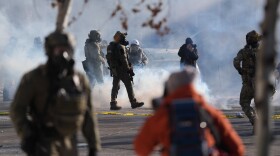In 2014, tens of thousands of families fled Central America to the U.S. in an attempt to escape gang violence. Since that period, asylum requests in the U.S. have increased, but asylum approvals are declining.
A new report by The Marshall Project documents the challenges asylum-seeking families face in immigration court. The majority of cases involving families seeking asylum have ended with deportation orders in absentia, meaning asylum seekers did not show up for their court hearing.
Their absence in court is partly due to fear of being detained by Immigration and Customs Enforcement officers or their inability to pay for an attorney. Asylum-seeking families face a particular set of obstacles at an immigration court in Charlotte that has a reputation for denying asylum requests.
Host Frank Stasio talked with Julia Preston, reporter for The Marshall Project, and Atenas Burrola, director and managing attorney at the Latin American Coalition’s Immigrant Integration Center, about asylum seekers in North Carolina.
INTERVIEW HIGHLIGHTS:
Preston on the increase in deportation orders in absentia since the 2014 border surge: These are families that started coming across the southwest border in 2014. They were funneled by the Obama administration into the asylum system. In many cases they did not run from the border patrol. They turned themselves in to the border patrol at the border and they requested protection in the United States. Because the immigration courts are so clogged and overburdened, a lot of these cases are only now coming up for adjudication and decision by immigration judges in the courts. The alarming figure that has emerged is that almost 70 percent of these asylum claims are ending in deportation orders that are issued by immigration judges in absentia to empty courtrooms because families have not turned up for their hearings.
Burrola on why many asylum seekers do not attend their court hearings:One is fear and the other is misinformation. So a lot of families are afraid that if they go to court they will be deported immediately, and misinformation feeds into that. So people say, “No don’t go to court. Why are you going to bother going to court? You’re just going to get a deportation order anyway.” But related to the fear is the fact that in order to win an asylum case you need an attorney in Charlotte, which serves both North Carolina and South Carolina. So in our Charlotte court, you cannot win an asylum claim without an attorney. And if these low-income families can’t find an attorney, we go back to they are afraid they are going to be deported, so they don’t show up to court.
Burrola on how migrants from Central American can qualify for asylum: The interesting thing is that it is a very case-by-case basis. The way our asylum laws are written is they are taken from international refugee and asylum law, but essentially you have to prove you were persecuted based on five reasons … They are race, religion, nationality, political opinion, or this nebulous thing called a “particular social group.” What this means in practicality is that asylum is not for people who are fleeing just general violence or economic instability. Somebody really has to have been persecuted for one of these five reasons in order to qualify. What we are seeing is a large portion of women and children, and men, but mostly women and children, who are fleeing Central America qualify under some articulation of a particular social group. There is no legal definition of a particular social group, so that is where we as lawyers have to figure out if somebody might qualify under some type of particular social group that has either be accepted by the courts or that could be if we think that it is viable.
Preston on the lack of pro bono representation for asylum seekers in Charlotte: In the Charlotte court there has been a critical dearth of pro bono representation. For example, when I was in the court doing my reporting, the judges were handing out a piece of paper to the people who were coming before them and very sternly telling these immigrants that they needed to contact the lawyers on that list because they were providing pro bono services. And I found that none of the lawyers who were on that list had been practicing in either North or South Carolina for three years. At the very least this court needs to improve the services that it’s offering to people who are coming before it so that they can look for pro bono services. In addition to that, I’m hoping that people in the Charlotte area, lawyers, will realize how critical the need is in this immigration court for pro bono services. It is very difficult for an immigration lawyer who has to make money– to make a living– and take one of these cases because it’s kind of a hard dilemma for a lawyer. You have to advise your client at the beginning what the chances are that you will win, and in the Charlotte court the chances have not been good. There is a crisis of representation in the Charlotte area that I think also needs to be addressed.
Burrola on one of her clients who fled Honduras in 2013: This woman in particular, her husband– they are not actually married but she calls him her husband– a local gang began threatening him and began threatening his family. They are not exactly sure why they were being threatened, but they started being threatened such so that she had to flee the town they lived in with him. They fled to another town. They kept being threatened, and over the course of about five years his father was killed. One of his brothers was killed. One of his brothers-in-law was killed, and one of his brothers as well as himself and my client were shot at … Eventually he fled first. He had to flee, because he was afraid he would be killed or the rest of his family would be killed. And after he fled, she continued getting threats towards herself and her small son … So eventually she had to flee as well … I don’t like calling them gangs because they are not gangs in what we think of here in the United States. They really are more of these international criminal organizations that are controlling large parts of these countries. But they essentially go after families, and for a lot of people the choice is either work with them and succumb to them, or flee, or die.








